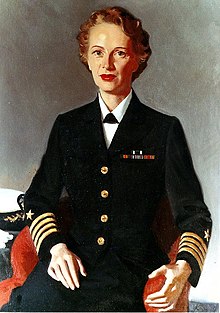
Born in Wildwood in 1898, red-headed Joy Bright grew up to pave the way for women’s equality in the military. Joy served in the Navy in both World Wars and retired with the rank of Captain in June 1953. She was among the first wave of females allowed to serve in the Navy and was instrumental in advancing their continued integration into that service. She received degrees from the George Washington University and the Crawford School of Foreign Service in Washington, DC; the Pierce School of Business Administration in Philadelphia; and the Paris Branch of the New York School of Fine Arts. She was also a licensed pilot.
Joy was one of six children, born to William Bright and Priscilla Bright. William Bright was the son of English and Irish immigrants who came to Wildwood in 1882 to work in real estate, banking and community affairs. He was elected Cape May County Sheriff in 1904. Being unable to secure a deputy, William Bright moved his family to Cape May Court House to manage the county jail. His wife was appointed deputy, without pay, and did the cooking of the inmate’s meals. Bright’s father was named jailer and supervised the cleaning crews and general maintenance of the jail. He later served as mayor of Wildwood and in the New Jersey Senate.
The Brights were a remarkable family sharing responsibilities and supporting women’s suffrage. Joy was inspired by well-known suffrage activists, including Carrie Chapman Catt and Jane Addams who visited the Brights’ home.
In her youth Joy mowed the grass and knew carpentry, traditional boys’ chores. She was proficient with tools. When the family got a Hupmobile she fixed the flats and made repairs. These sills eventually helped per prove that women could perform mechanical and technical jobs in the Navy.
After graduating from Wildwood High School in 1916 she attended business school where she acquired office skills. In 1918 she enlisted as a Yeoman (F) – the F was for female. She began as a courier but moved up to chief yeoman at the Cape May Naval Air Station. After WW1 Joy remained there as a civilian helping to decommission the site.
She married three times – first to Lieutenant Charles Gray Little, a Harvard graduate who flew dirigibles in France during the war. They were married in October 1920 in Yorkshire, England. Tragically before their first anniversary, he died when his dirigible exploded and crashed in the River Humber in August 1921.
Joy returned to the U.S. and worked in the Bureau of Aeronautics in Washington D.C. She edited the bureau’s newsletter which later became Naval Aviation News Magazine.
Joy met Lieutenant Commander Lewis “John” Hancock, a Texan and graduate of the U.S. Naval Academy. They married in June 1924 at her parent’s home in Wildwood. They set up housekeeping in Lakehurst. In another horrible twist of fate Hancock was killed when the rigid American airship Shenandoah crashed in Ohio during a storm on September 3, 1925.
This death brought her severe emotional and physical pain. Joy was hospitalized for almost a year. After which time she and her sister Eloise took a six-moth cruise to Asia and the Middle East ending up in Europe. It was in Cairo during that trip that she met an American Naval officer Ralph Oftsie.
When she returned to the U.S., she took up flying and worked at the Bureau of Aeronautics. During WWII Joy became a Lieutenant in the WAVES and was promoted to Commander in 1945. She insisted that women could work in many jobs in the military. After her mandatory retirement from the Navy in 1953 at age 55 she continued to serve as advisor on women’s affairs and helped expand the WAVES during the Korean conflict.
Joy met up again with Ralph Oftsie in St. Croix and they married in August 1954. Whey they were married Oftsie served as commander of the Sixt Fleet which operated in the Mediterranean. Sadly, Ralph Oftsie became ill in 1956 and died.
The Cape Women’s Resource Fund and the Cape May County Advisory Commission on the Status of Women Honored Joy Bright Oftsie posthumously on Women’s Equality Day August 26, 1992, the 72nd Anniversary of the ratification of the 19th Amendment to the U.S. Constitution granting women the right to vote.